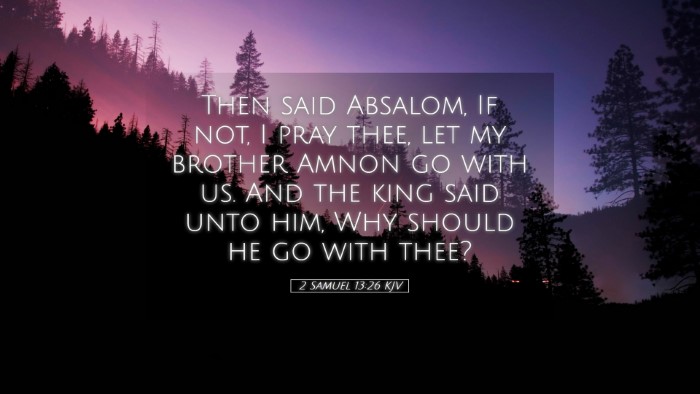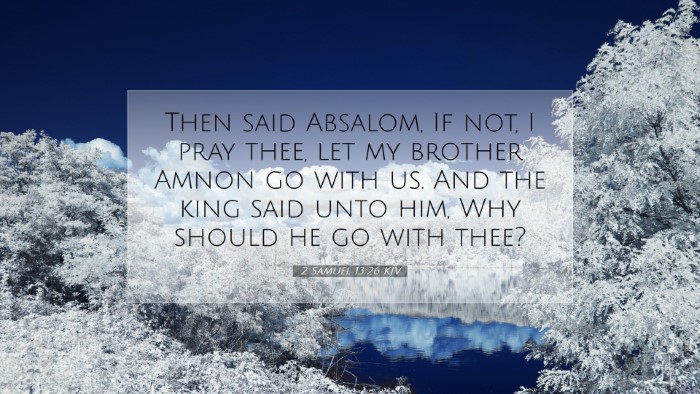Commentary on 2 Samuel 13:26
Verse Context: 2 Samuel 13:26 states, "But Amnon said, 'No, my brother, do not make me feel ashamed; for all of us are in this place.' And Absalom added, 'If not, let my brother Absalom go and have him killed.' So he asked, 'Why should he go?'
This verse falls within the narrative of Amnon, Tamar, and Absalom and covers the tragic events that transpire in David's family. The complexities of sin, betrayal, and family dynamics are evident in the text, inviting critical examination.
Insights from Matthew Henry:
According to Matthew Henry, this verse highlights a significant moment of strife and tension among David's children. It shows the depth of Amnon's shame—shame that arises not merely from his actions but from the consequential familial discord. In Henry's view, Amnon represents the destructive power of unchecked desires leading to moral and relational collapse.
Henry further points to the nature of familial relationships, emphasizing that dishonor among kinfolk does not merely injure the individual but can fracture the entire family unit. Here, Amnon's refusal hints at a deeper recognition of guilt and the social ramifications he faces.
Insights from Albert Barnes:
Albert Barnes expands the understanding of this passage by contextualizing it within the broader narrative of David's household chaos. Barnes observes that this moment is pivotal, as it foreshadows the impending conflict between Absalom and Amnon. The tension hinted at by Amnon's plea for shame avoidance signals the larger tragedy of betrayal and vengeance that will sweep through David's lineage.
One of the significant aspects that Barnes points out is the impact of sin on family dynamics. He argues that this shame serves not just as a personal affront to Amnon but as a mark of the consequences that fallout from sin committed within the family structure. The entangled relationships—filled with anguish and bitterness—invite subsequent violence and division.
Insights from Adam Clarke:
Adam Clarke's commentary delves into the psychological aspects of Amnon's character, suggesting that his plea reveals an intense inner conflict. Clarke posits that despite Amnon’s wrongdoing, there is a glimmer of self-awareness concerning the gravity of his actions. The mention of 'all of us are in this place' reflects a conscious awareness of the broader implications of sin.
Moreover, Clarke emphasizes the nature of shame as a powerful emotion that can stymie actions and compel individuals to rethink their choices. His interpretation underscores that the shame felt by Amnon goes beyond personal guilt; it encapsulates the community's response to sin, reflecting the Biblical principle that sin has far-reaching consequences that extend beyond individual action to communal impact.
Theological Reflections:
- The Nature of Sin: This passage illustrates how sin breeds complications in relationships, highlighting the psychological and spiritual turmoil that follows.
- The Dynamics of Family: The text prompts reflection on familial loyalty and betrayal, echoing the essential call to resolve conflicts in love and justice.
- The Consequences of Actions: The interplay between Amnon’s plea and subsequent actions epitomizes the reality that choices made in secrecy can explode into public failures.
Pastoral Application:
For pastors and members of the ministry, this passage serves as a poignant reminder of the gravity of sin and the relational breakdown it can cause. It calls for vigilance against personal desires that can spiral into broader familial pain.
Moreover, the dynamics of shame and guilt demonstrated here can be leveraged in counseling contexts, helping individuals confront their struggles and guiding them towards healing and reconciliation.
In preaching, this narrative provides fertile ground for exploring themes of confession, accountability, and the need for pastoral care in times of familial crisis.
Conclusion:
Thus, 2 Samuel 13:26 captures a critical moment brimming with emotional depth and narrative significance. The insights gathered from Henry, Barnes, and Clarke challenge readers—pastors, students, theologians, and scholars alike—to grapple not just with the text itself but with the realities of sin and the urgent need for grace within family dynamics.


